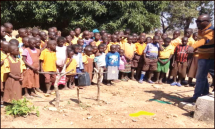Ghana Behavior Change Support Project (BCS)
The Ghana Behavior Change Support (BCS) Project, 2009-2013, was a 4 year United States Agency for International Development (USAID) supported project managed by the Johns Hopkins Center for Communication Programs with CARE and PLAN International in partnership with the Ministry of Health and the Ghana Health Service (GHS).
The overall purpose of the project was to assist the GHS at the national, regional and district levels to support its efforts to achieve health related millennium development goals through sustained and coherent social and behavior change communication (SBC) interventions. BCS aimed to increase demand and use of commodities and services and create positive behaviors in the areas of: Maternal Neonatal & Child Health Family Planning Malaria Prevention & Treatment Nutrition Water, Sanitation, & Hygiene
The BCS project was audience-focused and driven by the community and family level where behavior and norms are formed. The primary focus was on households with children and youth, and the communities they live in, the providers they go to, and the district and national leaders that impact them. The project employed the Communication for Social Change model. This aims to blend community, interpersonal, and mass media approaches building synergy around three strategic elements or engines.
Addressing a wide spectrum of health topics simultaneously through an integrated approach, Ghana BCS created educational and entertaining programs/series continued over the duration of the project. It worked closely with regional, district, & sub-district health teams to build and strengthen the network of local NGOs to undertake effective and synergized community mobilization in both rural and urban settings.
Projects managed by the BCS Project include:
Source: Johns Hopkins Center for Communication Programs
Date of Publication: March 15, 2020
SIMILIAR RESOURCES
Tools
Examples
- Creating Mobile Health Solutions for Behaviour Change: A Study of Eight Services in the mNutrition Initiative Portfolio
- The (re)solve Project
- Reaching First-Time Parents and Young Married Women for Healthy Timing and Spacing of Pregnancies in Burkina Faso
- Community Communication MNCH e-Manual: Participatory Health Promotion Sessions
- The ECHO Study Report
- Lever les Tabous: La sexualité et les approches promouvant l’égalité des genres pour mettre fin aux unions et aux mariages d’enfants, précoces et forcés
- Innovation Brief: Engaging Influencers and Non-Traditional Actors in Participatory Processes for Family Planning Program Design
- Innovation Brief: Breaking Down Barriers to Family Planning Access by Engaging Agents of Change
- Innovation Brief: Translating Audience Segmentation Data into Family Planning Programmatic Action
- Innovation Brief: Identifying Power Dynamics Among Target Audiences and Influencers in the Project Design Process

